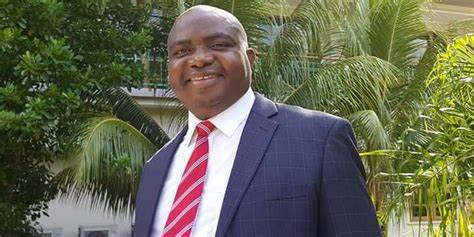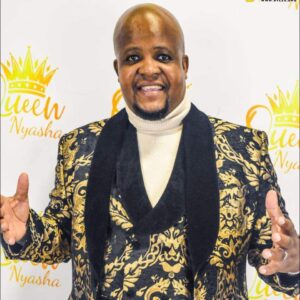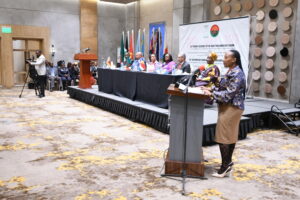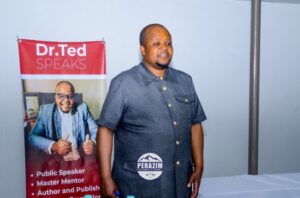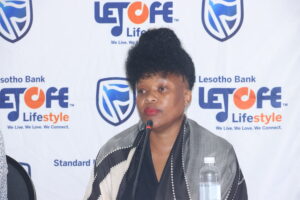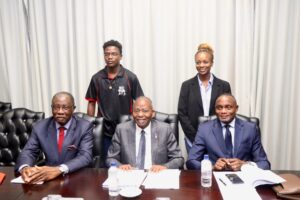By Special Correspondent
There is growing interest in public hearings convened by the SADC Parliamentary Forum, with many people using them to bring issues affecting them and recommendations to the attention of their elected representatives, an official has said.
Mr. Sheuneni Kurasha, is the Program Manager, Democratisation, Governance and Human Rights (DGHR) at the SADC PF. In an interview, he highlighted the overwhelming interest in the third edition of the public hearings hosted by the Forum recently.
Kurasha noted a significant increase in the diversity of participants, emphasising the active involvement of young people, women, and individuals with disabilities in the submission process.
“The response we have seen from the public has been remarkable,” Kurasha stated.
“These hearings provide a vital platform for citizens to express their concerns and opinions on various regional issues. However, the overwhelming number of submissions has also presented challenges, as we were unable to accommodate every participant due to time constraints,” he stated.
The commitment to inclusivity was further reinforced with the integration of sign language services during the hearings, ensuring that “no one is left behind.”
Kurasha expressed optimism, recognising the growing interest and ownership of public hearings by citizens as a fundamental aspect of a representative parliamentary body.
He detailed the next steps for the many valuable submissions received during the hearings that took place in October. He said the Standing Committees of SADC PF had analysed the inputs and prepared reports for the upcoming 56th Plenary Assembly session, scheduled to take place in Livingstone, Zambia, from December 8 to 15, 2024.
“The Standing Committees serve as delegates of the Plenary Assembly, the highest decision-making body within SADC PF,” explained Kurasha.
“They will deliberate on thematic issues, table reports, and make recommendations, which will then be discussed and adopted by the plenary. Once these reports are approved, they become binding decisions that are conveyed to national parliaments, relevant government ministries, and civil society organisations for further engagement.”
He emphasised the importance of these recommendations, stating that they will serve as “evidence upon which programming takes place.”
The Committee’s third public hearing session was oversubscribed.
Chaired by Honourable Leonard Mwalwanda of Malawi, the hearing was held virtually under the theme: “Leveraging the Role of SADC Parliamentary Forum in Facilitating Citizen Participation in SADC Regional Integration for Enhanced Accountability and inclusive Socio-Economic Development and Cohesion”.
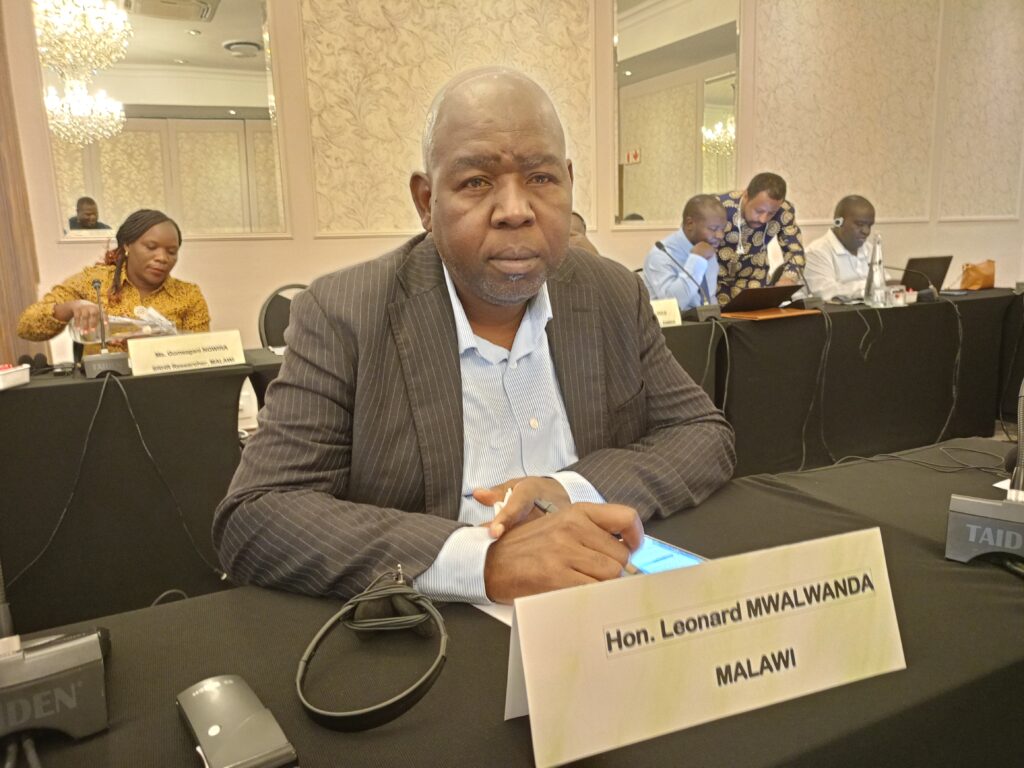
Hon Mwalwanda noted that many SADC states – South Africa, Madagascar, Mozambique, Botswana, Mauritius and Namibia – held elections this year.
Although SADC missed the opportunity to monitor some of these elections, the committee should remain actively engaged with SADC elections particularly assessing how close the legislative framework provisions are aligned with the SADC Model Law on Elections, he said.
The committee members elected Hon Francoise Ndokwa Bemba of the DRC as the vice chairperson of the committee. She will serve until 2026.
The meeting focused on six thematic issues as articulated by Kurasha. These are:
Strategies SADC Parliaments can adopt to strengthen their oversight and legislative functions in promoting democracy-building and democratic consolidation across member states; measures that can be taken to improve electoral transparency and integrity to prevent post-election violence and build trust in the electoral process; how SADC Member States can ensure the protection of electoral rights, including the right to vote, stand for office, and access to information, particularly for marginalised and vulnerable populations; challenges and opportunities in the domestication of the SADC Model Law on Elections, and how civil society can collaborate with parliaments to promote its adoption and implementation; strategies that can be adopted to combat the spread of disinformation and propaganda on social media during elections, while balancing freedom of expression; and how electoral systems and political processes can be reformed to ensure greater youth participation and representation in elections and governance.
The Speaker of the 3rd SADC Youth Parliament, Hon Nsama Patrick Mpundu, made a presentation on “Ensuring the Protection of Electoral Rights for Marginalized and Vulnerable Populations in SADC Member States”.
He said it is parliament’s duty to ensure every citizen, regardless of background or status, participates in governance.
Hon Mpundu said lack of electoral information by marginalised groups including rural populations, ethnic minorities, illiterate voters, was the biggest challenge they face in the electoral process.
He noted that marginalised groups face political and ethnic intimidation which must be stopped to guarantee free elections through strict enforcement of punitive measures for culprits of electoral malpractice.
Mr. Tendai Shephard Mbanje, of the African Centre for Governance made submissions on measures for improving electoral transparency and integrity to prevent post-election violence and how to build trust in the process.
He said democracy fatigue among states impacted electoral integrity in the face of political competition characterised by disinformation and misinformation. He called for transparency to build trust and prevent post-election violence.
Mr Joseph Dube, director of Disarmament and Arms Control in South Africa said CSOs in SADC and International Network on Explosive Weapons (INEW) have long expressed concern with the use of explosive weapons in populated areas.
“Civilians suffer complex life changing injuries and long-term psychological distress from living under bombing and the impact on children is particularly acute, due to their physiology, stages of development, and dependence on caregivers,” he said.
A key step towards preventing and mitigating the harm caused by explosive weapons in populated areas is the political declaration on strengthening the protection of civilians from the humanitarian consequences of the use of explosive weapons in populated areas.
Dr Augustine Magolowondo, Regional Director for Democracy Works Foundation spoke on “Enhancing the Role of Political Parties in Democratic Consolidation in southern Africa.”
He said it is important to have a shared conceptual understanding of political parties.
“A political party is usually considered a voluntary association, formed independently of the state and joined by several individuals,” he said.
He explained that in Africa in general and southern Africa in particular, political parties are recognised as key players in democracy. He noted that even in countries where political parties were yet to become a norm than an exception, there was some form of political organisation or political formation and elections, as a way of choosing political leaders, had also become a norm.
Mr Victor Shale of the Electoral Commission of South Africa said the Principles and Guidelines for the Use of Digital and Social Media in Elections in Africa are a tool for safeguarding electoral integrity in the digital age.
He recognised digital and social media as a double-edged sword that can either undermine or promote the conduct of elections.
He said the guidelines provide a comprehensive framework on how electoral management bodies, and electoral stakeholders can extract maximum value on the use of digital and social media and how to address the inherent risks.
SADC Youth Parliament head of the Education, Science and Technology Standing Committee Hon Rabby Gelson Ndombassy looked at ‘Strategies to Combat the Spread of Disinformation and Propaganda on Social Media During Elections.’
He said the challenges posed by misinformation and propaganda on social media
significantly undermine the integrity of electoral processes, particularly in the Southern African Development Community (SADC).
“The rising prevalence of social media as primary communication channels necessitates the urgent adoption of effective strategies to mitigate the impacts of misinformation,” he said.
Ndombassy said addressing the challenges posed by misinformation and propaganda on social media during electoral periods is a complex yet vital endeavour to safeguard democracy and uphold the integrity of electoral processes in SADC.
The Global State of Democracy Initiative made a presentation on Strengthening the Legitimacy of Elections on a Time of Radical Uncertainty.
It found that one in three people will vote in countries where the quality of elections is significantly worse than it was five years ago, and electoral outcomes are disputed relatively frequently.
The organisation noted that the global rate of electoral participation had declined as elections had become increasingly disputed with countries experiencing net declines in democratic performance far outnumbering those with advances.
Despite the many threats to elections and the declines found in many countries, elections retain their promise as a mechanism for ensuring popular control over decision makers and decision making, it noted.
The Instituto Para Democracia Multipartidaria (IMD) of Mozambique looked at how electoral systems and political processes could be reformed to ensure greater youth participation and representation in elections and governance.
It said youth inclusive political participation is not only a fundamental political and democratic right but also crucial to building stable and peaceful societies and developing policies that respond to the specific needs of younger generations.
It added that when there are obstacles to participating in formal, institutionalized political processes, young people can rapidly feel disempowered. Many tend to believe their voices will not be heard or that they will not be taken seriously even if they are heard.
More from Africa News 24
Letofe has helped Lesotho artistes grow – Mookho
In her presentation, Pauline Dempers, the National Coordinator, Namibia Small Arms, Light Weapons (SALW), saidthe proliferation of small arms and light weapons contribute immensely to political, economic, and social insecurity.
“Transnational or cross border crimes such as drug and human trafficking, armed robberies, vehicle theft are committed with SALW.”
She said uncontrolled spread and widespread availability of SALW undermine human security, more than any other kind of conventional weapon, by impacting a wide range of areas: they damage fragile economies, deter foreign investments, divert economic resources, and inhibit the fulfilment of basic human needs.
Proliferation of SALW in southern Africa is a direct consequence of the years of conflict (during colonial and apartheid) in the region, she noted.
She said in response and to curb the proliferation of SALW, SADC member states adopted the Protocol on the Control of Firearms, Ammunition, and related Materials (SADC Firearms Protocol in 2001), the same year that the global firearms Protocol, as well as the Program of Action on Small Arms and its International Tracing Instrument were adopted.






